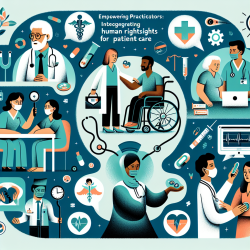Introduction
As a special education director, it's crucial to remain informed about global initiatives that aim to improve mental health care and uphold human rights. One such initiative is the World Health Organization's QualityRights initiative, which has recently been evaluated in Ghana. This study offers valuable insights that can enhance the skills of practitioners and encourage further research.
Understanding the QualityRights Initiative
The WHO QualityRights initiative is designed to assess and improve the quality of care and respect for human rights in mental health facilities. In Ghana, the initiative aimed to evaluate psychiatric facilities across different regions, providing evidence on the quality of care and human rights adherence. This evaluation is particularly significant given Ghana's ratification of the United Nations Convention on the Rights of Persons with Disabilities (UN CRPD) and the enactment of a Mental Health Act in 2012.
Key Findings from the Study
The study conducted in Ghana revealed several critical challenges in implementing the UN CRPD principles within psychiatric services. Here are some of the main findings:
- The rights to an adequate standard of living and the highest attainable standard of health were not fully promoted.
- Initial steps were taken to ensure the right to exercise legal capacity and personal liberty, but significant gaps remain.
- There is a lack of promotion for the right to live independently and be included in the community.
Implications for Practitioners
Practitioners can improve their skills by implementing the outcomes of this research in several ways:
- Advocacy for Human Rights: Practitioners should advocate for the full implementation of human rights principles in mental health care, ensuring that service users are treated with dignity and respect.
- Training and Education: Continuous education on international human rights standards, such as the UN CRPD, is essential for mental health professionals.
- Developing Community-Based Services: There is a need to develop community-based mental health services that promote independent living and community inclusion.
Encouraging Further Research
The findings from Ghana's QualityRights initiative highlight the need for further research in several areas:
- Resource Allocation: Investigate how resources can be better allocated to support mental health services, particularly in rural areas.
- Non-Pharmacological Interventions: Explore the development and implementation of non-pharmacological interventions to support mental health recovery.
- Monitoring and Evaluation: Establish robust monitoring and evaluation systems to ensure continuous improvement in mental health care quality.
Conclusion
The WHO QualityRights initiative in Ghana provides a framework for improving mental health care and upholding human rights. By implementing these findings, practitioners can enhance their skills and contribute to a more equitable mental health care system. To read the original research paper, please follow this link: A nationwide evaluation study of the quality of care and respect of human rights in mental health facilities in Ghana: results from the World Health Organization QualityRights initiative.










